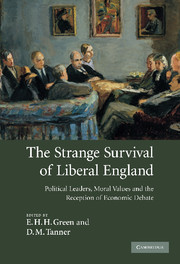 The Strange Survival of Liberal England
The Strange Survival of Liberal England Book contents
- Frontmatter
- Contents
- Acknowledgements
- List of abbreviations
- List of contributors
- Introduction
- Part I Economic ideas and political leaders
- Part II The use and abuse of economic ideas: Keynes and his interpreters
- Part III Economic forces and their significance
- 8 Where did it all go wrong? Cultural critics and ‘modernity’ in inter-war Britain
- 9 Moral choice and economics: British political economy in the twentieth century
- Index
9 - Moral choice and economics: British political economy in the twentieth century
Published online by Cambridge University Press: 04 July 2009
- Frontmatter
- Contents
- Acknowledgements
- List of abbreviations
- List of contributors
- Introduction
- Part I Economic ideas and political leaders
- Part II The use and abuse of economic ideas: Keynes and his interpreters
- Part III Economic forces and their significance
- 8 Where did it all go wrong? Cultural critics and ‘modernity’ in inter-war Britain
- 9 Moral choice and economics: British political economy in the twentieth century
- Index
Summary
Peter Clarke's substantial contributions to British history have been concerned with many themes. But they have been productively unified by a consistent, often innovative, and always refreshing, attention to the relationship between ideas, events and policy-making – and, more finely, by an exploration of the influences that run between politics and economic ideas, usually from the latter to the former, but occasionally, and tellingly, from the former to the latter. The result has been a deeply perceptive understanding of political economy, which explores its dynamics and evolution in the setting of the twin worlds of pragmatic, often pressing, problems, and intellectual architecture. The capacity for this to include ample scope for moral assumptions, sometimes structuring economic arguments, sometimes hiding within them, has been amply demonstrated in other essays within this collection.
This chapter considers merely one aspect of these issues by discussing some of the moral implications and consequences of a limited number of important themes in the economic history of modern Britain: the long-run performance of the economy; the structural changes associated with that performance; and the attitudes and actions which were shaped by the experience and even more by the perceptions, first of macro-economic and structural change, and second, of the ways in which the fruits of growth might be distributed.
- Type
- Chapter
- Information
- The Strange Survival of Liberal EnglandPolitical Leaders, Moral Values and the Reception of Economic Debate, pp. 275 - 306Publisher: Cambridge University PressPrint publication year: 2007
- 1
- Cited by


